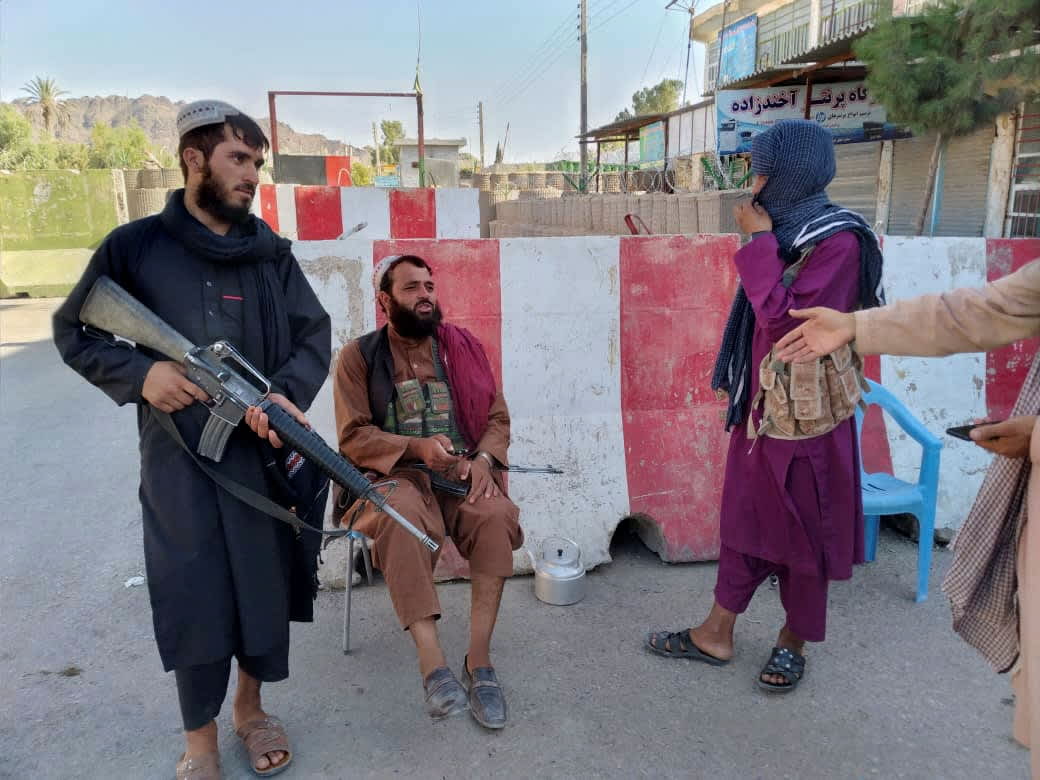U.S. deploying 3,000 troops to help evacuate Afghan embassy staff as Taliban advances

A Taliban fighter stands guard at the entrance of the police headquarters in Ghazni on August 12, 2021, as Taliban move closer to Afghan capital after taking Ghazni city.
AFP | Getty Images
The U.S. is deploying 3,000 troops to Afghanistan in order to facilitate the drawdown of the U.S. Embassy in Kabul to a “core diplomatic presence,” as Taliban militants rapidly advance toward the Afghan capital.
The troops, which will consist of three infantry battalions from the Marines and Army, will deploy to Hamid Karzai International Airport within 24 to 48 hours, according to Pentagon spokesman John Kirby.
“This is a very narrowly focused mission of safeguarding the orderly reduction of civilian personnel out of Afghanistan,” Kirby told reporters during a press briefing Thursday.
When asked if the troops had a combat mission, Kirby said U.S. forces always maintain the right to self defense but the mission is temporary with a focus on protecting the movement of civilian personnel.
Kirby told reporters that the U.S. military is still on track to complete its withdrawal by August 31.
The Taliban captured the strategic city of Ghazni on Thursday, bringing their front line within 95 miles of Kabul, a staggering development that comes nearly two weeks before U.S. and NATO coalition forces exit.
The militants also claim to have captured Afghanistan’s third-largest city, Herat, in the northwest close to Iran. Fierce fighting has also been reported in Kandahar, the nation’s second-largest city.
“In light of the evolving security situation, we expect to draw down to a core diplomatic presence in Afghanistan,” State Department spokesman Ned Price said Thursday.
Secretary of State Antony Blinken and Defense Secretary Lloyd Austin spoke with Afghan President Ashraf Ghani earlier Thursday to coordinate planning, according Price.
The U.S. Embassy, for the second time this week, urged Americans to leave Afghanistan immediately, warning that its ability to assist citizens is “extremely limited even within Kabul” due to deteriorating security conditions and reduced staffing.
However, Price emphasized that the U.S. Embassy remains open and the State Department is ramping up its efforts to relocate Afghans who worked with the U.S. during the war.
Since President Joe Biden‘s April decision to withdraw U.S. troops from Afghanistan, the Taliban have made stunning battlefield advances with now nearly two-thirds of the nation under its control.
Despite being vastly outnumbered by the Afghan military, the Taliban seized three provincial Afghan capitals as well as a local army headquarters in Kunduz on Wednesday, according to The Associated Press.
Wednesday’s gains came on the heels of a dramatic weekend blitz where the group took five provincial Afghan capitals.
At the Pentagon, spokesman John Kirby told reporters on Wednesday that the continued Taliban offensive across the war-torn country runs against a commitment made last year by the group to engage in peace talks with the Afghan government.
“What we’re seeing on the ground is that the Taliban continues to advance and to assume control of district and provincial centers that clearly indicates that they believe it is possible to gain governance through force, through brutality, through violence, through oppression, which is at great odds with their previously stated goal of actually wanting to participate in a negotiated political solution,” Kirby said.
Afghan security personnel patrol after they took back control of parts of the city of Herat following fighting between Taliban and Afghan security forces, on the outskirts of Herat, 640 kilometers (397 miles) west of Kabul, Afghanistan, Sunday, Aug. 8, 2021.
Hamed Sarfarazi | AP
He added that while the Pentagon is concerned to see such advances by the Taliban, the Afghan military must now leverage the nearly two decades of training from U.S. and NATO coalition forces.
“They have the advantage in numbers, in operational structure, in air forces and in modern weaponry and it’s really about having the will and the leadership to use those advantages to their own benefit,” Kirby said.
“The recipe can’t be just a constant U.S. presence in Afghanistan that never ends,” he added.
An Afghan special force member attends a military operation against the Taliban fighters in Kandak Anayat village of Kunduz city, Afghanistan, July 23, 2021.
Ajmal Kakar | Xinhua News Agency | Getty Images
At the White House on Tuesday, Biden told reporters that he does not regret his decision to withdraw American troops from Afghanistan, despite shocking gains by the Taliban.
“Look, we spent over a trillion dollars over 20 years, we trained and equipped with modern equipment over 300,000 Afghan forces,” Biden said.
“Afghan leaders have to come together,” the president added. “They’ve got to fight for themselves, fight for their nation.”




